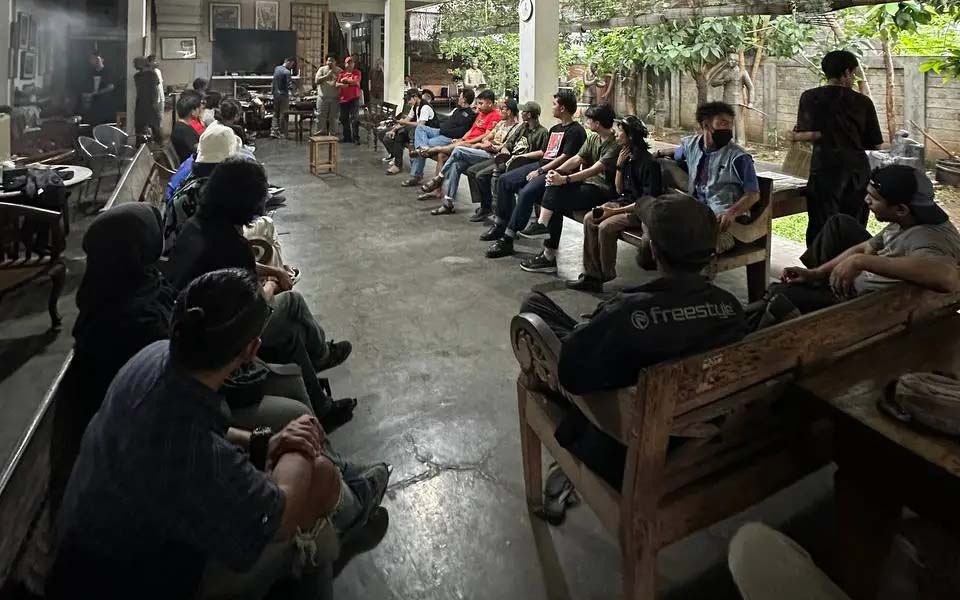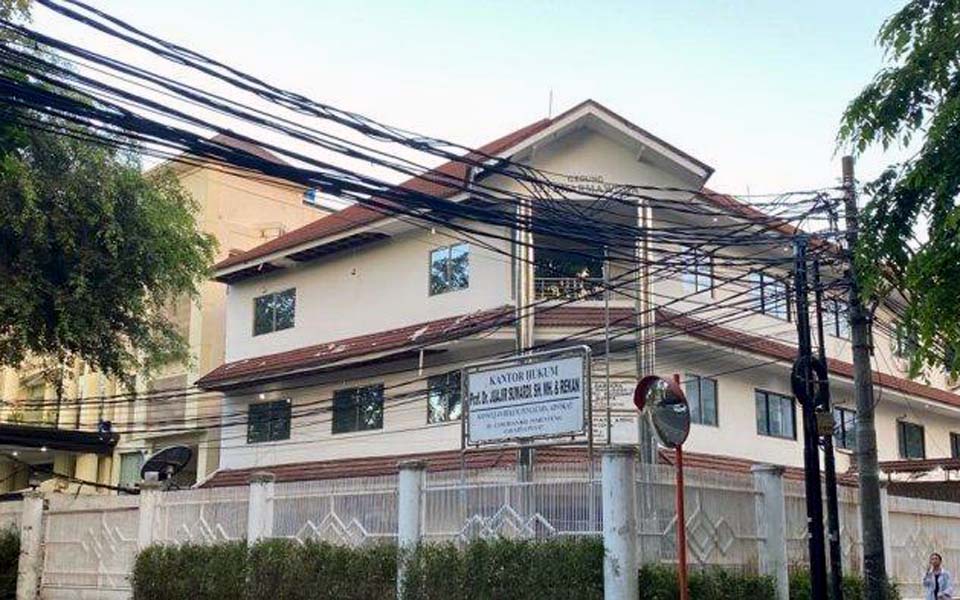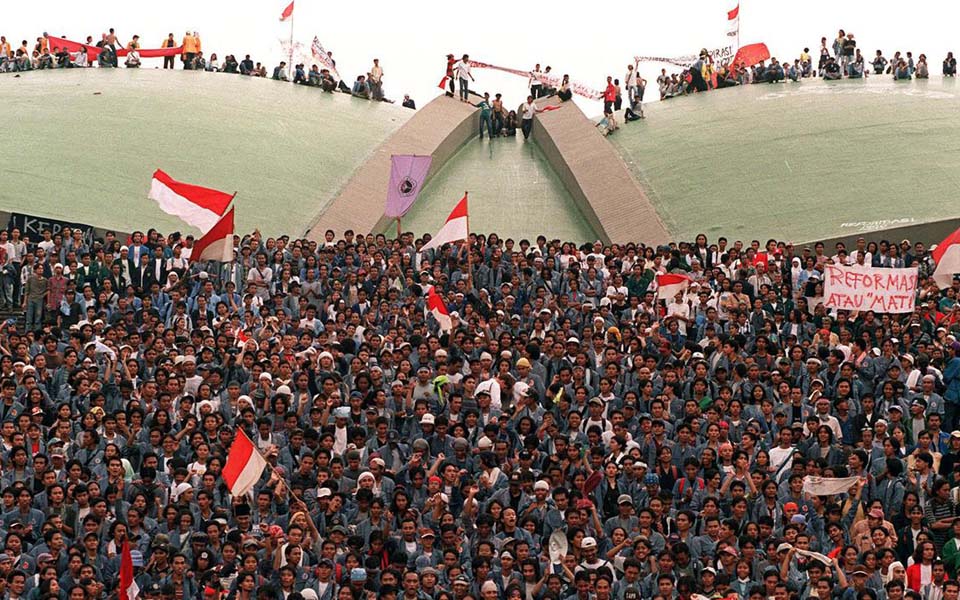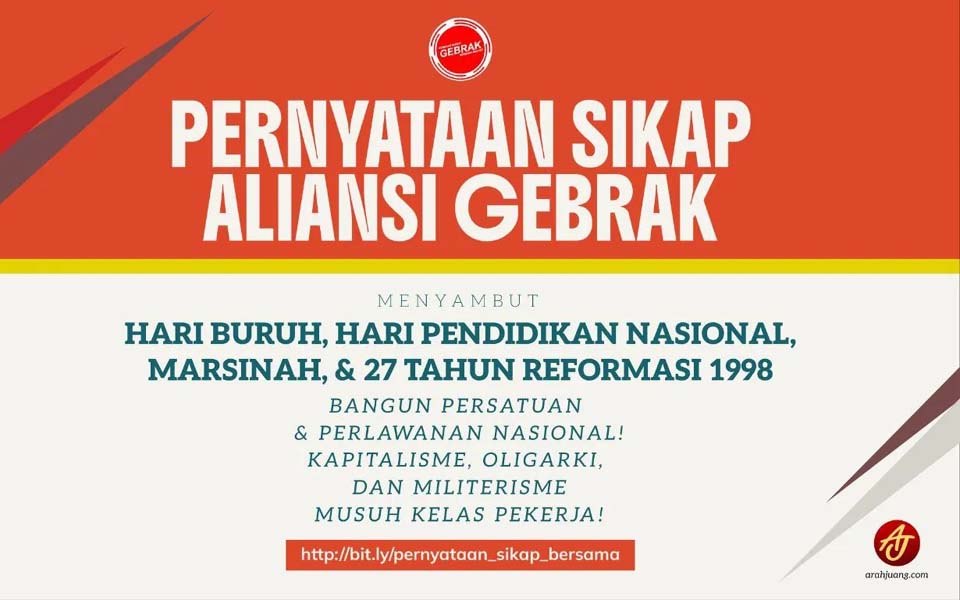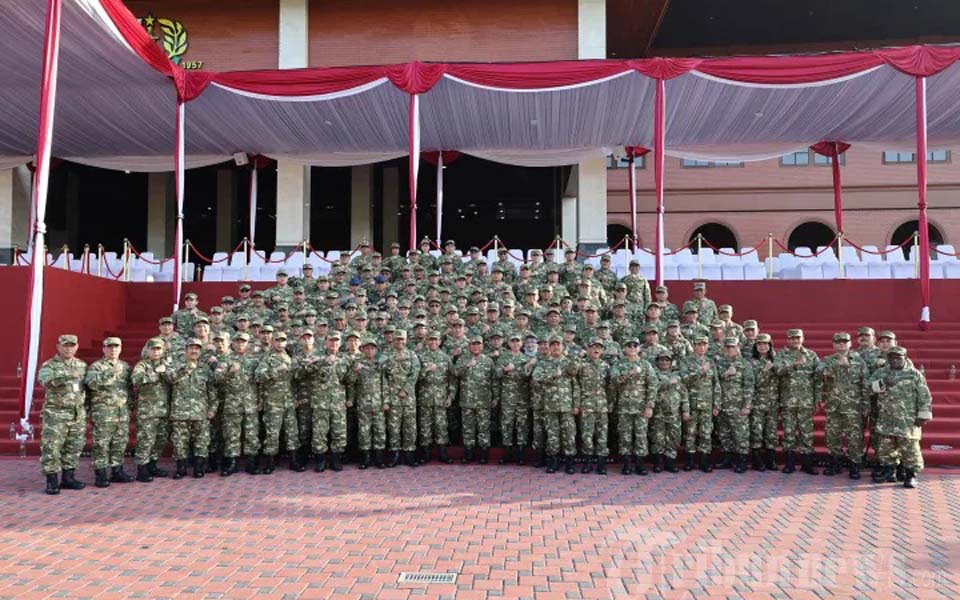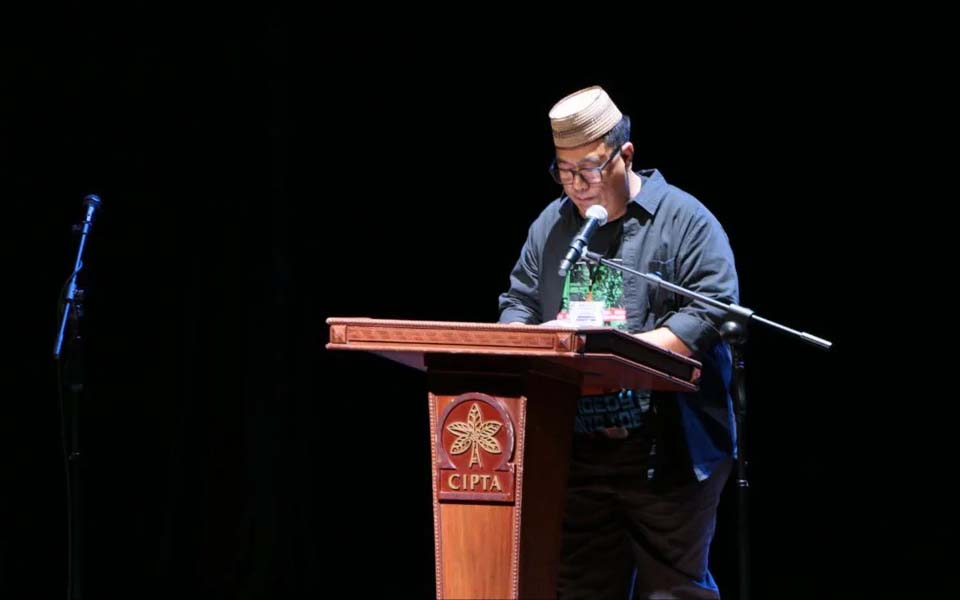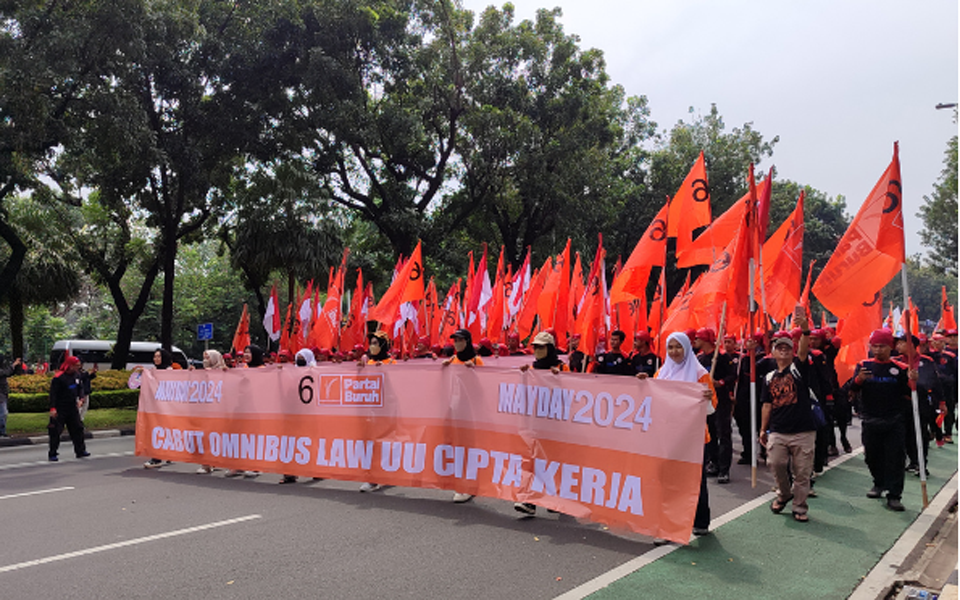On March 23 a fast breaking gathering and discussion was held on "The International and National Situation". The event was initiated by the Socialist Union (Perserikatan Sosialis, PS) and the People's Liberation Party (Partai Pembebasan Rakyat, PPR). The PS and PPR recognise the need for a space where left-wing organisations and groups can meet, discuss and debate a wide range of issues.
The discussion forum was not intended to rival any consolidations or alliances already formed by other organisations or groups. The event was attended by approximately 60 people from dozens of political organisations, trade unions, student organisations, women's organisations and others.
The event was opened with remarks from the PS and PPR. Comrade Surya from the PPR opened the event with a warm greeting while explaining the purpose of the discussion. "Although there have been many political actions and interventions carried out by left-wing groups", Surya explained, "Not many have prioritised left-wing ideas and concepts as a driving force for the people's movement itself". "Therefore...", he continued, "it is hoped that the left-wing organisations present here can consolidate the goals and direction of their work towards establishing socialism in Indonesia".
Meanwhile, Comrade Mahe from the PS also offered a few words of welcome to his left colleagues. After welcoming everyone to the fast breaking event, Mahe expressed his hope that the discussions held at the event would continue, fostering discussion and debate among left groups in Indonesia. Furthermore, this event could open up opportunities for cooperation among left groups.
Before the discussion session began, all participants who were present sang The Internationale together, led by comrades Surya and Mahe and accompanied by a piano arrangement by comrades from the Indonesian Green Party (PHI).
The discussion was also moderated by two comrades from the PS and the PPR. The PS moderator began with a brief opening followed by a discussion on political, social, and cultural issues. It was clear that there has been a democratic regression in Indonesia over the last 10 years and following the 2024 election of President Prabowo Subianto, whose camp immediately began political consolidation with almost all parties in Indonesia. Furthermore, there has been many polemics regarding industrial production in Indonesia, such as the wave of layoffs, underdeveloped industrialisation, rampant corruption and so on.
The discussion began with responses from colleagues from the Militant Trade Union Federation (F-SEBUMI), the Populist Labour Movement Federation (FGBK) and the Indonesian Trade Union Congress Alliance (KASBI), who argued that the ratification of the Draft Law on the Indonesian Military (RUU TNI), now the TNI Law, pose a significant challenge to the political sovereignty of civil society, particularly for workers' rights advocates in Indonesia. Furthermore, the neo-liberalisation of Indonesian industry has led to declining wages. This situation has been exacerbated by the Omnibus Law on Job Creation passed in 2020. Furthermore, the wave of layoffs and budget cuts that began in early 2025 are the result of the political-economic consolidation of the bourgeoisie and the ruling class. These issues beg the question: What can the left do? What ideas can we offer society to resist?
A representative attending from the Indonesian People's Union of Struggle (SPRI) put forward a statement on how we (progressive groups) can continue to exist as a movement, and how we can "surf" in public to promote progressive socialist ideas. Following this, colleagues from the PPR and PS provided some additional readings of the political situation. They were of the view that the widespread economic crisis experienced worldwide is closely linked to the rise of far-right political movements that promote issues based on race and ethno-nationalism as their primary solution. These movements do not seek to address the root cause of the crisis, namely capitalism, but rather tend to blame the vulnerable and oppressed who lack economic sovereignty as the root of their problems. They continued by asking how can we consolidate the progressive forces? Because if resistance to capitalism is undisciplined, no serious movement will emerge.
Another important statement came from a colleague from the Papuan Student Alliance (AMP). In West Papua, the expansion of capitalism has led to widespread destruction of protected and indigenous forests. The authorities have not taken the economic and social problems in Papua seriously. Furthermore, Prabowo's rise to the presidency has exacerbated the impact of militarism in Papua. The comrade continued stating that the movements in Indonesia, particularly in Papua, remain fragmented. Therefore, an alliance is needed to fight for West Papua's liberation.
There were many more readings of the political situation put forward by each organisation's representatives. For example, the PHI argued that the bourgeoisie and the ruling class have taken over environmental discourse to make it more pro-capitalist. The Grassroots Front for the Sovereignty of Natural Resources (FNKSDA), a pro-environmental Islamic organisation, argued that religious organisations in Indonesia have been held hostage by the regime, as have their followers. Therefore to move issues raised by Islamic organisations toward environmental issues has become increasingly difficult as they conflict with the government's interests.
Several issues that had been explained by each organisation were the main points of the discussion held during the second session after breaking the fast. The comrades in arms gathered at the Garuda People's Veranda to socialise with one another and enjoy the food served for the fast breaking. Following this, the forum agreed to begin the second session, moderated by a colleague from the PPR. They explained that the purpose of the second session was to respond to each comrade's readings of the political situation in the first session.
The first response came from a comrade from the Agrarian Resources Centre (ARC) and representatives from Padang Halaban residents, whose village is North Sumatra is threatened with eviction for a plantation development project by PT SMART. They (the Padang Halaban residents) are descendants of the victims of the massacre carried out by the military and reactionary civilian militias in 1965. In 2025, they are again faced with the threat of being removed from the land where they live by the TNI. They are working with the ARC to address this and hope to be able to resist the government's decision to evict them from their homes.
Continuing the discussion on the Indonesian political movement, representatives from the Joint Secretariat (SekBer), the National Students Front (FMN) and the Indonesian Workers Federation of Struggle (FPBI) stated that the need for more substantial resistance is urgent. First, the need to unify political issues with societal issues to further mobilise the public in the democratic process. Second, how we can maintain our political power under the onslaught of the regime's political repression? Third, we must consider how to integrate the student, labour and social movements.
Furthermore, a representative from the United People's Struggle (KPR) argued that political debate and discussion are familiar to us on the left. However, the comrade stated that no meetings have yet been held to discuss what needs to be done. In other words, there has been no joint organisational work to form a structured and concrete resistance movement. They continued saying, "The problems we face today are clear, but our main focus should be a unified movement aimed at advancing working-class power".
And finally, comrades from the Indonesian Students Union (SMI), the SPRI, and the Progressive Students School (SEMPRO) raised the idea that in order to move towards a genuine struggle, work on idelogisation to a wider social base must still be carried out. After that, we also need to step forward in the community, to prove that our commitment to the movement is not to deceive or use the community as mere pawns for power. In order to fight for all of this, there must be a movement to unite all elements of society in all corners of Indonesia to truly build a people's liberation movement against the oppression of capitalism.
At the end of the event, closing remarks were delivered by the management of the Garuda People's Veranda. They said that to establish socialism in Indonesia, we must be comradely with each another. Being comrades even if we have different opinions. Being comrades even if we have slightly different ideological understandings. Because a genuine movement only emerges from fraternity founded on one oppression, oppression under capitalism.
The event concluded with the making of a solidarity video for the farmers' struggle in Padang Halaban. The slogans chanted were: "People United, Will Never be Defeated! Padang Halaban! Reject Eviction!"
In addition to this, there was a video of solidarity greetings for the 6th Congress of the Socialist Union, which will be held with the theme: Building Professional Revolutionary Cadres to Realise a Revolutionary Party! For the Completion of the Democratic Revolution and the Victory of Socialism!
[Translated by James Balowski. The original title of the article was "Membangun Ruang Dialektika Gerakan Kiri Indonesia".]
Source: https://www.arahjuang.com/2025/07/10/membangun-ruang-dialektika-gerakan-kiri-indonesia/





